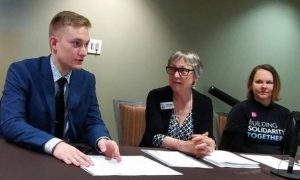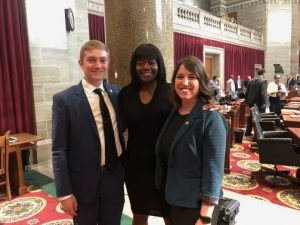From Missouri to DC: “All Politics is Local”
Right after the inauguration of President Trump in 2017, I accepted an internship in Missouri Senator Claire McCaskill’s office. This opportunity came just after I finished a year of working on state-wide political campaigns, including helping fight against the proposed (and now passed) Missouri voter ID law. I was about mid-way through my political science degree and assumed that my work in Senator McCaskill’s office would largely follow the local political path that I had been pursuing for the past year. As I would find out, life had slightly different plans in store.

Caughron speaking at a panel in Springfield about the importance of addressing partisan gerrymandering, combating voter suppression, and other critical issues.
In Senator McCaskill’s office, I got to see a completely different side of public service than what one might see on TV shows like “The West Wing” or learn about in political science classes. In my office, we focused almost exclusively on constituent casework regarding the Veterans Administration. I got the opportunity to sit down with constituents in our office and walked them through the process of officially filing for help from our office.
Families let us into their lives and, sometimes, into their homes to talk about what problems they were going through. I’ll never forget one woman that we helped towards the end of my time in Senator McCaskill’s office. Ill and with poor eyesight, the woman felt completely lost after losing her husband just a month before. I visited her at home and showed her the paperwork needed to properly begin the process of collecting information on her behalf from the VA. She called our office after a neighbor convinced her to try calling her Senator’s office for help. A few weeks after we closed her case, she called us back and thanked my supervisor and me for all the work we did on her behalf and called our work a ‘blessing’. It was an incredibly touching moment. ‘This is what public service should be,’ I remember thinking to myself after that call, ‘people just helping their neighbors’.
I learned in this position that US foreign policy is often cloaked in patriotic language, like “fighting terrorists” or “spreading freedom”. This language often shrouds the full consequences that such policies have not only on communities abroad, but also on our own communities here at home. Working for Senator McCaskill, I saw that cloak pulled back for the first time. We regularly assisted spouses whose partners never came back home and mothers who lost their sons. Frankly, it was shocking to me how many of these types of cases we dealt with during my time in the office. This made me realize just how deeply interwoven all our communities are to the destruction being wrought abroad.

Caughron with Michelle Brent (center) and Missouri State Representative Crystal Quade (right) on the State House floor in Jefferson City, MO. Daren worked on issues of poverty and fighting sexual assault on college campuses while in Quade’s office.
I felt somehow compelled to use my experiences and my education to fix this deeply broken system. I felt called to do my part to end the ill-conceived strategies that were killing countless innocent civilians abroad, thousands of our own troops, and still not making the world any safer in the process. It was in my Latin American Politics class that I really began to explore what a career in foreign policy might look like.
My professor, Dr. Ondetti, happened to stumble across the Scoville Fellowship one day while working in his office and forwarded me the informational flier about the program. It seemed like a perfect fit. I would have the opportunity to work for an NGO doing just exactly what I wanted to do, advocating against our policies of endless war. I immediately began the process of applying. To my surprise, I was chosen as a finalist for the program.
During my interviews with potential host organizations, I came across one NGO whose work spoke deeply to me – the Friends Committee on National Legislation Education Fund. In my position on the Peacebuilding team, I help coordinate the Prevention and Protection Working Group – a coalition of NGOs focused on informing the government about on-going conflicts and atrocities. The group then uses the information they provide to push the government to pursue locally led peacebuilding and conflict prevention work around the world. This work is so important, because the only other alternative to this work is more war and, as a result, more lives lost both abroad and here at home. My long-term project at FCNL has been leading the production of a new assessment on the implementation of the Colombian peace accords – helping push US policy to support a true resolution to the 52 year-long conflict.
If you would have told me last fall that I was going to be moving to DC to work in foreign policy for a faith-based advocacy firm, I would have laughed in disbelief. I didn’t think that this sector was for me. I didn’t think people from the middle of the country truly belonged in this work. I am so glad to find out just how wrong I was.
While my entry into this field was about as far away from traditional as one can get, I am forever grateful for the journey that led me to the Scoville Fellowship. Working for Senator McCaskill humanized this work in a way that I do not think any other experience would have. Working in state politics gave me the basic political instincts and knowledge needed to work in this world. I truly learned that lives lost in war are not just numbers on some policy-tracking spreadsheet. Each “number” was a loved one, a neighbor, or a friend to someone else. In the grand scheme of US policy, it is easy to forget this. I learned that, even in places far removed from the bustle of DC as Springfield, foreign policy directly affects us all in profound ways. It has been an honor to be a Scoville Fellow at FCNL and an honor to push for a more peaceful world for every community, including for small towns like mine.
Daren Caughron is a Spring 2020 Scoville Fellow at the Friends Committee on National Legislation Education Fund.

